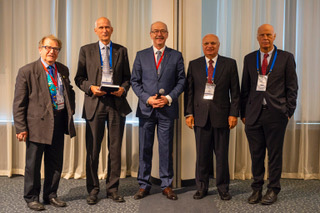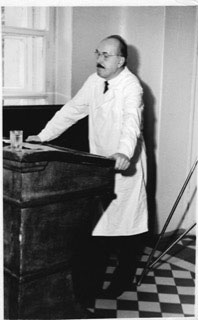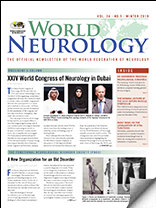Sergei V. Lobzin, V. Goldobin, and N. Tcinzerling
The XXI annual Davidenkov Readings Neurological Congress took place on the Sept. 26-27 in St. Petersburg, Russian Federation. The meeting is named in honor of the prominent Russian neurologist Prof. Sergei Davidenkov (1880-1961), who made substantial contributions to the development of neurogenetics and neuromuscular diseases. He described a new clinical form of myopathy, scapular-peroneal amyotrophy, and founded one of largest scientific neurological schools in Russia.

(Left to right) Prof. Alexander Skoromets (Russia), Prof. Nils Erik Gilhus (Norway), Prof. Sergei Lobzin (Russia), Prof. Raad Shakir (UK), and Prof. Wolfgang Grisold (Austria).
The congress was organized by S.N. Davidenkov, chair of neurology of I.I.Mechnikov North-Western State Medical University. The chair of neurology was founded in 1893 as the first Imperator Clinical Institution of the Grand Duchess Elena Pavlovna, which has continued since it remains as one of the leaders of neurology education in the Russian Federation.
Thousands of neurologists from different cities and countries from across the world gain more experience in neurology at the university annually. Close scientific and educational relationships connect our institution with the department of neurology at the University of Bergen (Norway) as a result of great efforts and perseverance of many, especially Prof. Nils Erik Gilhus, Prof. Ole-Bjorn Tysness, Prof. Tiina Rekand, and Prof. Lars Thomassen, among others.
These relationships allowed the establishment of a most creative exchange with university teachers and students as well as PhD postgraduate students.
Cooperative studies of myasthenia, spinal cord injuries, and other disorders of the nervous system were initiated as well as annual seminars about ”Neurology in Northern Europe,” which bring opinion leaders from Norway and the Russian Federation.
Prof. Vladimir Semenovich Lobzin
This year’s Davidenkov Readings Congress was devoted to a celebration of the 95th anniversary of honored scientist of Russia, Prof. Vladimir Semenovich Lobzin, who held our chair from 1982 until 1992.

Prof. V.S. Lobzin 1977.
Prof. Lobzin was the disciple of the legendary Prof. Alexander G. Panov, who in 1935 primarily described tick-born encephalitis in Vladivostok. Prof Lobzin left a huge scientific legacy: 506 scientific publications, 28 books, mostly on challenging questions of clinical neurology, and 22 investigations. In 1957, he described a clinical test in myasthenia gravis (phenomenon of muscular fatigue generalization, oculopalpebral symptom). Prof. Lobzin published the first Russian monograph on myasthenia in 1960, and he managed to organize the All-Union Center for myasthenia investigation in 1971, which provided medical care for many patients with this severe disease from different parts of the then Soviet Union.
His eponymic reference contains seven symptoms and syndromes described by Prof. Lobzin. Among them were the ”three twins syndrome” in migraine (arterial hypotonia, hemicrania, and cholecystopathy, 1977), later completed by his son Prof. S. Lobzin with the “fourth twin” (craniovertebral dysplasia type Kimmerle and Chiari) in 2001.
The “phenomenon of pale spot” on the face after intravenous injection of nicotinic acid solution in patients with facial nerve palsy was also described by Prof. Lobzin, proving the compressive and ischemic origin of the pathology. Moreover, he described rhombencephalitic syndrome in mumps and myasthenic syndrome in patients following ionizing radiation due to nuclear reactor accidents.
The series of research investigations of Prof. Lobzin concerning hypokinesia and hypodynamy in young healthy adults trained in Cosmonaut Corps for prolonged space traveling is crucial. The disciples of Prof. Lobzin became leading professors of neurology in the Soviet Union and continued developing his scientific ideas. A significant part of Prof. Lobzin’s scientific creativity was devoted to research of neuroses, asthenic conditions, and autogenic training.
The investigations of Prof. Lobzin concerning infectious lesions of the nervous system were extremely interesting. He proposed a classification of meningitis, defined approaches to aetiologic and pathogenic treatment of these diseases and also for “arachnoiditis.”
Bekchterev Protege
The evolution of neurology in St. Petersburg owed much to dedicated scientists, such as Prof. Lobzin, who in turn can be considered continuation of the Russian neurological scientific school founded by Vladimir Bekchterev (1857-1927), because the teachers of Prof. Lobzin were disciples of V.Bekchterev. Unfortunately, the “iron curtain” and consequent limitations in scientific information exchange did not allow foreign colleagues to be familiar with the unique scientific achievements that Russian scientists made despite meager funding and nearly complete absence of feedback from leading foreign partners.
Fortunately, nowadays neurologists from St. Petersburg and also from other parts of the world have the opportunity for creative exchange of scientific information in most aspects of neurology aimed at further improvement of medical education quality and to provide adequate care to neurological patients. Nowadays, many staff members of the department of neurology named after S.N. Davidenkov are members of the European Academy of Neurology and the World Federation of Neurology, allowing direct exchange of views and experience in the diagnosis and treatment of a large number of severe pathologies of the nervous system.
The latest Davidenkov Readings Congress in 2019 was attended by 1,153 delegates, during which 117 scientific reports concerning important aspects of clinical neurology (such as stroke, degenerative pathology of the nervous system, neuromuscular diseases, neurooncology, neurocardiology, neurorheumatology, neurogerontology, child neurology, urgent neurology, headaches and migraine, neurorehabilitation, cognitive disorders, Alzheimer disease, Parkinson disease, peripheral nervous system pathology, cerebral and spinal cord injuries and their consequences) were presented. It should be emphasized that participation for neurologists is traditionally free of charge.
The delegates felt the real support from the World Federation of Neurology. The lectures for Russian neurologists from world-leading neurologists was met with a keen interest. The faculty included WFN Past-President Prof. Raad Shakir (U.K.), who devoted his lecture to the relationship between neurology and psychiatry, WFN Secretary General Prof. Wolfgang Grisold (Austria), who demonstrated difficulties in the differential diagnosis of neoplastic aetiology of cranial and other peripheral nerves, and Prof. Nils Erik Gilhus (Norway), who presented a review of neurological disorders and complications during pregnancy. These scientific lectures were closely followed by the audience with great interest and generated considerable debates among neurologists from Russia and other countries.
Challenging Discussions
During the congress symposia and roundtable discussions, the leading scientists from Russia and other countries shared views on challenging and difficult issues related to a large number of disease diagnostics and treatment; this is extremely important for the northernmost megametropolis of Europe – St. Petersburg, the population of which according to unofficial data is more than 7 million inhabitants. The importance of interaction with governmental and municipal services in cases of strokes is clear, and the local neurological community of St. Petersburg is concerned about the frequency, severity, and rehabilitation difficulties of stroke patients despite the setting up of 14 regional neurovascular centers that contain all of the necessary equipment and multidisciplinary teams. In addition, the elderly population of St. Petersburg is over 1 million people, making the situation of provision of care to the elderly more difficult, and creating an urgent need for international cooperation in cognitive disorders such as Alzheimer disease and other forms of dementia.
Thus, modern neurology in St. Petersburg continues to evolve, and it requires further support from the World Federation of Neurology, which will lead to improvement of neurological care all over the world. The Russian Federation is a unique country due to its multi-ethnic and multicultural background from the West and East. Our experience will certainly be useful for all neurologists across the world. We hope that continuation of the annual “Davidenkov Readings” will draw the attention of neurologists from all the countries, particularly as the meeting takes place in one of the mostly beautiful cities in the world with a well-developed and modern infrastructure. We invite all those who are interested to participate. •
Professor Sergei V. Lobzin is vice President of the St. Petersburg Association of neurologists, academician of Peter the Great Academy of Science and Art, professor, head of the Chair of Neurology named after S.N.Davidenkov of North-Western state medical university named after I.I.Mechnikov, where V. Goldobin and N. Tcinzerling are Associate Professors.
